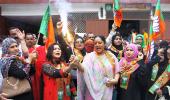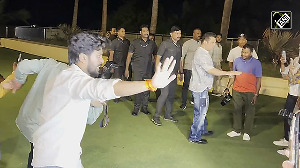Campaigning in Aligarh is subdued with major parties focusing on their core support bases.

In the Muslim community, views on this Lok Sabha election seem to vary, with some seeing it as crucial for India's pluralism while others feel neglected by political parties.
Muslims are a sizeable community in the Aligarh parliamentary constituency.
According to the 2011 Census, Islam is the second-most popular religion in Aligarh city, a lock-making hub in western Uttar Pradesh, with over 40 per cent of people following it.
"For me, this election is about safeguarding the Constitution, which grants me and everyone else in this country the right to equality," Shadab Khan, a 45-year-old driver at the Aligarh Muslim University (AMU), said.
Many others in Aligarh's Muslim community echoed his sentiment.
Syed Aamir, a worker at a local eatery in the city's Shamshad market, described this election as a matter of survival for pluralism in India.
"If we don't vote now, we may lose this chance forever," Aamir said.
There is also a sense of disillusionment among some Muslim voters as well, such as Mohammad Shiraz from Aligarh's Civil Lines area who feels overlooked by political parties.
"The ruling party doesn't need our vote and the opposition assumes we have no choice but to vote for them. That is why even though the elections are just a few days away, no party worker has approached us, let alone candidates," Shiraz said, highlighting a perceived lack of engagement from political actors.
Amid all this, election campaigning in Aligarh remains relatively subdued, with candidates from major parties like the BJP and the Samajwadi Party (SP) focusing heavily on specific demographic groups.
The BJP's incumbent MP Satish Gautam is prioritising outreach to the trader community, a traditional support base for his party, while the SP is concentrating on mobilising support from Jat villages.
"Our alliance is fighting on Hindu-Muslim unity in Aligarh, that goes without saying, but just like in exams, you concentrate more on tough subjects. We are doing the same but we carry the welfare of the Muslim community in our hearts," a Samajwadi Party functionary told PTI.
Mohammad Sajjad, a professor at AMU's history department, that in the current atmosphere of 'majoritarian consolidation', minority voters often feel redundant. He felt that issues such as economic inequality and religious pluralism have been overshadowing.
"The way majoritarian consolidation has been observed for many years, the question is not about Muslim votes anymore. It is about whether Hindu voters should lean towards Hindutva or a pluralist and tolerant Hinduism. Whether they will vote based on economic issues such as poverty, unemployment, economic inequality or solely on matters of religious supremacism," he told PTI.
"This decision will ultimately be made by the majority community; the minority of 10-12 per cent does not retain such specific importance. This is something the Hindus have to decide," Sajjad added.
AMU, one of India's largest residential universities, stands as a focal point in this narrative.
According to academic experts like Dr Iftekhar Ahmad Ansari, the institution embodies India's secular and pluralistic ethos but also faces the challenge of adapting to evolving democratic and societal demands.
"Muslims have never voted as a conservative block as they have been labelled to. They have not voted en-masse... but they vote for those who can best conserve and foster their culture which they have been brought up into and that is the plural culture," Ansari said.
"Even at AMU, the perception of Muslims of having conservative mindset or that they have the herd mentality is not the fact here they have been very open-minded," the associate professor at the political science department told PTI.
Professor Syed Ali Nadeem Rezavi also expressed similar views, saying there is not a single Muslim here who can be termed 'anti-national'.
"The Muslims here would talk about their rights and doing that does not make you anti-national," he said.
Aligarh goes to poll in the second phase of elections on April 26. Khair, Baroli, Atroli, Kol and Aligarh city are assembly segments in the Aligarh parliamentary constituency.











 © 2025
© 2025